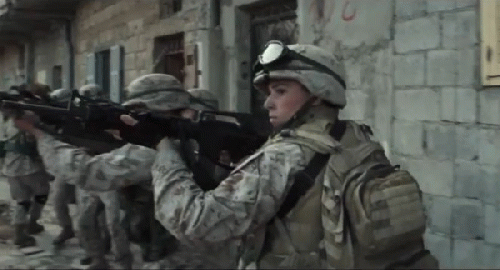Readings for 3rd Sunday in ordinary time: DT 18: 15-20; PS 95: 1-2, 6-9; I COR 7: 32-35; MK 1: 21-28
Today's readings are about resistance to oppression. They invite us to side with the oppressed and poor in their fight against world-class bullies -- to understand the world from the viewpoint of the "unclean." Seen from that perspective, "American Sniper" is full of insight. It calls us to think critically about whose side we are on in the endless wars our country wages.
The need to see reality "from below" is a major point of today's first reading. There the message of Moses announcing liberation of the oppressed is presented as the criterion of prophetic truth. Those who teach like Moses (on behalf of the enslaved) should be listened to. False prophets with another message should not. This first reading from the Jewish tradition goes on to promise the advent of another prophet like Moses.
By virtue of its inclusion in the liturgy of the word, today's gospel selection from the Christian tradition identifies Jesus as fulfilling the Mosaic promise. He not only astounds people by his authoritative way of speaking. His action on behalf of a man considered "unclean" demonstrates Jesus' prophetic authenticity.
That insight was on my mind last week when I decided to see "American Sniper" for myself. I had read the reviews. I knew the criticisms. But I wondered what it would look like if I followed the suggestions of today's readings and viewed the film "from below," from an Iraqi perspective.
What I discovered was surprising.
Viewed from the underside of history, "American Sniper" was a tribute to the world's poor and oppressed -- especially to the heroic people of Iraq. That's because "American Sniper" was about resisting bullies the way the Iraqis have since 2003.
That bully theme is not farfetched. It was announced in one of the film's opening scenes.
There an adolescent Chris Kyle is instructed by his father about three ways of being in the world. Kyle, of course, is the film's central character -- the most lethal sniper in the history of the American military. He is believed to have killed 255 Iraqis in his 4 tours of duty. Many, it is certain, had their heads blown right off.
"You can be a wolf, a sheep, or a sheepdog" Kyle's father tells him (in my paraphrase). "Wolves are bullies; they are cowards preying on the weak. Sheep are simpletons who go along, following the herd; they do nothing about bullies. They too are cowards. The way to deal with bullies" says Kyle's father," is to be a sheepdog and protect those the bully preys upon.
"I want you to be sheepdogs!" the elder Kyle shouts at his sons, "Don't let the bullies have their way."
Ironically, the rest of "American Sniper" shows how Chris Kyle entirely rejected his father's advice, but also how Iraqi patriots unconsciously heeded it. They emerge in the film as the sheepdogs Kyle's father admired.
For his part, Kyle joins a gang that specifically preys upon the weak for no good reason -- simply because it can and because (as Kyle writes) it's fun. Chris Kyle became a gangster bully.
No, he didn't join the "Crips" or "Bloods," "Sharks" or "Jets." He joined the "Seals." And their destructive power was beyond belief. To begin with, their gang attire was fearful including matching helmets and boots, flak jackets, camouflage, wrap-around sunglasses, and night vision goggles. They had guns of all types, unlimited supplies of bullets, grenades, missile launchers, armored vehicles, helicopters, planes, and sophisticated communication devices. They prowled in menacing groups along the streets of Bagdad pointing guns at open windows and doors, pedestrians and drivers.
But it wasn't easy for aspiring bullies to become Seals; doing so required absolute submission and humiliation. So as with all gangs, they had their initiation rites. These included merciless hazing and demeaning tests of endurance. Such rites of passage were accompanied by constant indoctrination that left initiates exhausted and absolutely malleable. In terms of today's responsorial psalm, their hearts were sufficiently hardened for the inhuman tasks before them.
(Note: You can view every article as one long page if you sign up as an Advocate Member, or higher).






